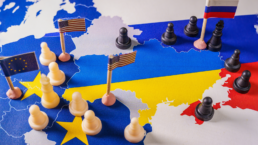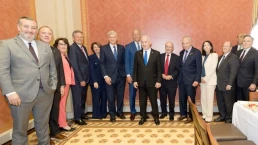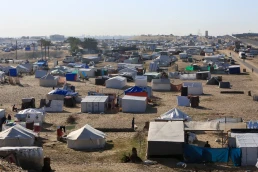Alfred McCoy explores the geopolitics of the new cold war and the relentless geopolitical struggle over Eurasia.
By Alfred McCoy, Tom Dispatch
From his first days in office, Joe Biden and his national security advisers seemed determined to revive America’s fading global leadership via the strategy they knew best — challenging the “revisionist powers” Russia and China with a Cold War-style aggressiveness. When it came to Beijing, the president combined the policy initiatives of his predecessors, pursuing Barack Obama’s “strategic pivot” from the Middle East to Asia, while continuing Donald Trump’s trade war with China. In the process, Biden revived the kind of bipartisan foreign policy not seen in Washington since the Soviet Union collapsed in 1991.

Writing in the December 2021 Foreign Affairs, a group of famously disputatious diplomatic historians agreed on one thing: “Today, China and the United States are locked in what can only be called a new cold war.” Just weeks later, the present mimed the past in ways that went well beyond even that pessimistic assessment as Russia began massing 190,000 troops on the border of Ukraine. Soon, Russian President Vladimir Putin would join China’s Xi Jinping in Beijing where they would demand that the West “abandon the ideologized approaches of the Cold War” by curtailing both NATO’s expansion into Eastern Europe and similar security pacts in the Pacific.
As Russia’s invasion of Ukraine loomed in late February, the New York Times reported that Putin was trying “to revise the outcome of the original Cold War, even if it is at the cost of deepening a new one.” And days later, as Russian tanks began entering Ukraine, the New York Times published an editorial headlined, “Mr. Putin Launches a Sequel to the Cold War.” The Wall Street Journal seconded that view, concluding that recent “developments reflect a new cold war that Xi Jinping and Vladimir Putin have initiated against the West.”
Instead of simply accepting that mainstream consensus, it couldn’t be more important right now to explore that Cold War analogy and gain a fuller understanding of how that tragic past does (and doesn’t) resonate with our embattled present.
Recent Posts
Why Are Democratic Lawmakers Still Meeting With Netanyahu?
July 12, 2025
Take Action Now Pictures show Democrats like Chuck Schumer standing next to Netanyahu, smiling.By Sharon Zhang, Truthout A bipartisan group of…
Stop Israel’s Dystopian “Humanitarian City” Plan—Before It’s Too Late
July 11, 2025
Take Action Now For the past 20 months, the world has watched—and largely enabled—a genocidal campaign in Gaza. Over 55,000 Palestinians have been…
The “Liberal” International Order Is Criminalizing Palestine Protests
July 11, 2025
Take Action Now As Western governments repress Palestine solidarity and enable Israel’s impunity, the “liberal international order” is no longer…
Politicians Are Betraying Gen Z On Climate
July 10, 2025
Take Action Now While Gen-Zers thrift, knit, crochet, and find other ways to reduce our footprints, Trump and the GOP are greenlighting more climate…




